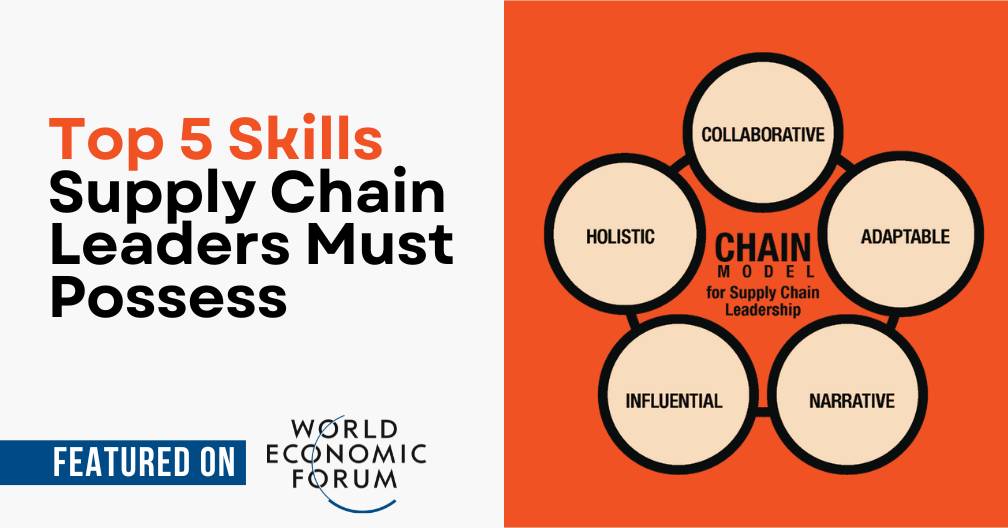While the supply chain leaders made their way into the boardrooms of global companies in the troubled years of disruptions, mainly caused by the pandemic, there are 5 top skills that these leaders agree to have made the greatest impact on their careers and might be the essence of what makes Chief Operation Officers (COOs) and Chief Supply Chain Officers (CSCOs) suitable to lead the businesses or be key candidates for leading organizations.
In an article published by the World Economic Forum, we have synthesized the “5 must-deliver skills for becoming a supply chain leader”, based on the recently published book “From Source to Sold – Stories of Leadership in Supply Chain” – written by Radu Palamariu and Knut Alicke.
From the conversations in From Source to Sold, it’s clear that there is no ‘one path’ to success in the supply chain industry. The contributors to this book have varying personal and professional backgrounds. They lead supply chains through varied experiences in different cultural and geographical contexts. Yet, there are some pronounced themes running through each of their leadership stories, which offer important insights into what it takes to be a successful supply chain leader.
These themes can be neatly summarized through what we call the CHAIN Model for Supply Chain Leadership, or Chain (C-H-A-I-N) which stands for: Collaborative, Holistic, Adaptable, Influential, Narrative
The CHAIN Leadership Model is now translated to the five key skills for becoming a supply chain leader:
Collaborative
Now collaboration is such a buzzword, right? We all hear it; the managers would repeatedly encourage us to collaborate, collaborate, collaborate. The nuts and bolts of it are for supply chain professionals, at every level of the hierarchy, to be aware and maintain communication within their department, with various other stakeholders in cross-functional departments, but also externally, with the various providers and partners that are part of the supply chain ecosystem, all for achieving the customer promise made when the products and services were sold.
Collaborating with external startups, and external ecosystems, can bring a wider perspective of what is possible, pushing the limits to optimize operations.
“A high-performing supply chain is not so much about processes and tools as about people collaborating and communicating effectively.” – Beatrix Praeceptor, Former CPO of Mondi Group
Holistic
In layman’s terms holistic means the individual supply chain professional understands how their job is participating in the ultimate objective of the company, and supply chain leaders orchestrate the operations by having a holistic view of the end-to-end supply chain when leading initiatives and the associated processes. A supply chain leader should be willing to listen to the feedback from the stakeholders, continue to learn, and elevate their products and services to be able to meet the organizations’ and customers’ standards.
“Good leadership needs a grasp of the end-to-end business. Good leadership needs to understand what it means to operate a business. For a company to truly leverage supply chain operations, it is critical to listen to consumer feedback and channel it upstream to improve products and services.” – Pier Luigi Sigismondi, Former President of Dole Worldwide Packaged Foods
Adaptable
The industry just got out of a global pandemic, and the experiences and learnings from that period are valuable. People have seen how the crisis affected the whole supply chain and with that being said, a supply chain leader should be adaptable and flexible. They should be able to mitigate risks and be prepared for future crises. They should be able to find opportunities during hard times and not only concentrate on one strategy but look at a global scale and see what else can be done to create flexible supply chains.
“Flexibility in your ideas is key in your leadership, especially in a business environment where it isn’t always easy to interpret the true nature of a situation and thus to fix on a single strategy.” – Chouaib Rokbi, Executive Vice-President of Digital Transformation and IT at STMicroelectronics
Influential
The ability to influence, according to Stephen Covey’s second principle is: to seek first to understand, then be understood, and then, on that basis, to try to influence the other person. In large organizations, the employees are segregated into pillars, departments, sub-departments, and teams, that will need to integrate and work together in delivering the services and products. This brings a constant opportunity for various stakeholders to work on finding a win-win scenario for the best business outcomes. Supply chain leaders need to be influential. They should be able to influence the different business stakeholders to collaborate into being successful from sales to planning, sourcing, making, and delivering the products.
“Ultimately, the supply chain is a people’s business, no matter what you’re building. It’s about getting the best from individuals and building strong, cross-functional teams.” – Jim Rowan, President and CEO of Volvo
Narrative
Influencing mostly addresses finding the win-win in one-on-one or one-to-few scenarios. Communicating vision through narratives is a key trait of leadership and can be seen as being influential in a scenario of one-to-many, being able to tell a story that gets people pumped, motivated, and inspired to work toward a common objective. A good supply chain leader should be able to explain the story of the supply chain, the lifeblood of the business, to every stakeholder in an impactful way.
“I sing inspirational songs during meetings and encourage people to sing along. Songs aren’t just to sing: they are a simple and easy way to communicate and to understand.” – Ken Allen, CEO of DHL eCommerce
The supply chain is a crucial part of any business and this has been proven by the disruptions and crises that the world has experienced over the last years. Good supply chain management brings a competitive edge and value to businesses. And to achieve this, an organization should have supply chain leaders who possess the skills of being Collaborative, Holistic, Adaptable, Influential, and Narrative. Leveraging their expertise can greatly help in the success of the business.
Source: World Economic Forum | 5 must-deliver skills for becoming a supply chain leader





